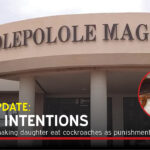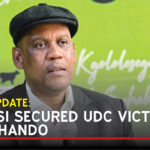Every expectant mother excitedly looks forward to delivering a healthy baby at the conclusion of their pregnancy.
However, for some, that excitement can be short-lived once they learn their little bundle of joy might have a disability.
In this eye-opening interview, Voice Woman speaks with Tshoganetso Kgarebe about the experiences and challenges of raising a child living with Cerebral Palsy, a lifelong physical disability that affects a person’s ability to control his or her muscles.
Determined to raise awareness of this often-misunderstood condition, Kgarebe, a junior high school teacher, marked World Cerebral Palsy Day on October 6th by educating children in her locality…
Please introduce yourself and give a brief background on your journey as a mother of a child with Cerebral Palsy.
I’m most comfortable being called Mama-ka-Lollie.
I think it’s because I don’t remember myself before I had her.
Anyway, I’m a mother to the most beautiful little girl living with Cerebral Palsy (CP).
Lollie was diagnosed with CP almost immediately after birth as a result of birth asphyxia (lack of oxygen).
I had the most amazing pregnancy; no cravings, no BP, no swollen legs, no nausea whatsoever.
Lollie’s CP was as a result of medical negligence when I gave birth at one of the private hospitals in our country.
At the time of her diagnosis, I had no idea what CP meant.
I was just thrown into the deep end with the medical term and, being a first-time mother in 2010, you can imagine how my world just crumbled the more I learnt of how this condition would affect my daughter’s quality of life and give my life a full 360 degree turn.
Fast forward to 2023, my daughter will soon be turning 13!
It’s been a hard 13 years of learning, growing, crying, bouts of depression and rewarding all at once.
On World CP day, you taught children in your community to understand a child living with CP – your daughter. How limited is she in terms of understanding the world around her?
Lollie lives in a world of her own and doesn’t comprehend much.
She can hear, yes, but for her to comprehend is a mammoth task.
Anything that she needs to do has to be taught repeatedly, with a lot of patience and, of course, time.
She’s basically a 13-year-old with the brain of a toddler.
The biggest challenge in raising her with this lack of comprehension is that she gets overstimulated most of the time and it leads to meltdowns where she can’t handle the normal things that a child her age can handle; things like too much noise, hooting of a horn, sudden change in anything, crowds, new environments, people visiting and leaving, etc.
How does CP affect your daily life?
Fortunately, Lollie is mobile, which is one thing I will never take for granted, but it does come with its own challenges.
She can’t go up or down stairs nor can she go to the ground without kneeling and holding onto something or when she stands up.
But the fact that she can walk is just enough for me.
I understand there was a time you raised funds to travel to India for surgery; what was it for and did it help?
As intervention, Lollie has been to Mumbai, India three times to do a stem cell transplant (STC).
In layman’s terms, it is a procedure where they try to wake up the dead brain cells.
Unfortunately, her brain cells for speech are completely dead and that is why she has no speech at age 13.
But I think the procedure has helped in terms of her level of understandings instructions, though not all of them.
Like I said, it takes repetition over time for her to learn anything.
STC needs to be accompanied by therapies, and they do not come cheap in Botswana and medical aid does not pay for a fraction of them.
Are there special provisions in our healthcare system to accommodate and support these children?
In terms of special provisions by the healthcare system, there are none that I’m aware of except the occasional physiotherapy, which comes once in months because of the lack of therapists in the country.
Government also gives disability grant of P600 which does not even cover the cost of her nappies for a month.
In your awareness activities, what is your most important message?
Raising a child with CP has affected my life immensely because, on a daily basis, I’m her advocate in everything.
No one can relate to what I go through.
You need to have a good caregiver since they do not come cheap owing to what it entails to bring her up.
You constantly have to plan for the future since there is the overwhelming thought of what would happen should I die tomorrow as my child is totally dependent on me; it’s a very scary feeling.
Who has been your biggest support?
It’s funny how people get offended when I say I don’t have anybody giving me the type of support I need. Occasionally, friends will support in terms of buying nappies or whatever essentials for her and I’m always grateful for that, but in terms of bearing the load and walking in my shoes, it’s me, God and the caregivers that I employ.
I don’t hold grudges because, at the end of the day, she is my daughter to take care of.
What advice can you share with new parents of children living with Cerebral Palsy?
They should always know that they are their children’s best advocates, listen to their instincts, and research as much as possible about the different treatment options available out there.
There are various organisations like Bravehearts Special Needs Association where parents of children living with CP have come together to support each other and raise awareness.

















